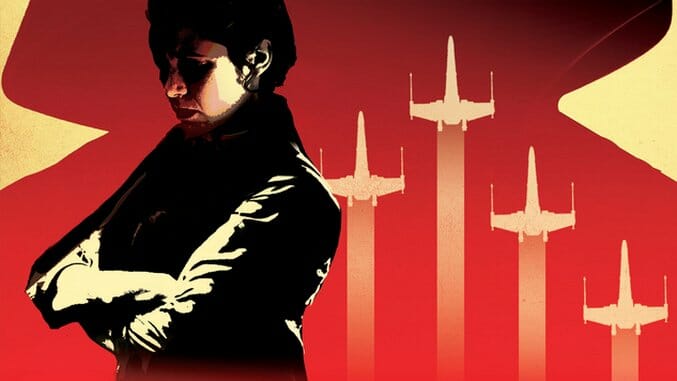Author Claudia Gray Corrects Star Wars’ New Literary Course with Bloodline

After the original Star Wars trilogy’s 1983 conclusion, fans had to wait three decades to see the canonical, on-screen extension of Leia, Han and Luke’s story. But as the credits rolled on last year’s Episode VII, The Force Awakens, information concerning the decades between the Empire’s fall and the First Order’s rise was never divulged. What had drawn Han and Leia apart? What about C-3PO’s weird red arm? How had Luke developed such a menacing glare?
Outside of the films, various mediums have filled in some of the blanks. The 2015 comic series Shattered Empire explored the lives of the Damerons (the parents of TFA’s resistance pilot extraordinaire, Poe Dameron, played by Oscar Isaac), while Chuck Wendig’s novel Aftermath showcased the post-Endor Battle lives of Rebel mainstay Wedge Antilles and newcomer Norra Wexley, setting the stage for the First Order to rise. At their best, The Force Awakens’ lead-up stories lovingly rehashed the Empire’s downfall (see writer Claudia Gray’s excellent, original trilogy-spanning YA book, Lost Stars). At their worst, the entries provided head-scratching pieces of fiction that never quite sat right with Star Wars fans.
 Now that The Force Awakens has been released on Blu-ray, it appears to be an appropriate time to tackle the backstory of one of TFA’s majorly unexplored players: Princess Leia Organa. Bloodline, a new Star Wars novel from writer Claudia Gray, highlights the years after The Return of the Jedi’s conclusion, diving head-first into Leia’s own emotional turmoil. At the mercy of her ever-growing political responsibilities, Leia’s separated from her son and, frequently, her husband. In the midst of a political process that often feels fruitless, Bloodline opens on Leia grappling with a hope that audiences already understand to be fruitless: escaping from politics. Oh, and she’s still dealing with that whole, “Darth Vader is my father” thing.
Now that The Force Awakens has been released on Blu-ray, it appears to be an appropriate time to tackle the backstory of one of TFA’s majorly unexplored players: Princess Leia Organa. Bloodline, a new Star Wars novel from writer Claudia Gray, highlights the years after The Return of the Jedi’s conclusion, diving head-first into Leia’s own emotional turmoil. At the mercy of her ever-growing political responsibilities, Leia’s separated from her son and, frequently, her husband. In the midst of a political process that often feels fruitless, Bloodline opens on Leia grappling with a hope that audiences already understand to be fruitless: escaping from politics. Oh, and she’s still dealing with that whole, “Darth Vader is my father” thing.
With Bloodline, fans will watch the growing foundation of the First Order, as well as Leia’s own Resistance—which makes this a fitting tale for Gray to tell. Like Lost Stars, Bloodline shows the birth of a terrifying new regime through characters who are neither pure-Dark Side or pure Light, making Star Wars’ future conflicts all the richer for it.
Gray answered a few of Paste’s questions via email, which you can read below. Bloodline is out now via Del Rey Books.
![]()
Paste: As a reader and a writer, what things do you believe are important to bring to Star Wars in terms of overall enrichment and immersion? What purpose do you think books such as Bloodline fulfill in the greater picture?
Claudia Gray: We get to find out more about so many elements of Leia’s life: Her senatorial career, her marriage to Han, what she felt and feels about Alderaan, how she wins loyalty from people, even some of her thoughts about Ben. I adored exploring that in the book, and I think SW fans love digging into details like this, especially the quieter, more personal stuff that’s less likely to be a featured element of one of the movies.
-

-

-

-

-

-

-

-

-

-

-

-

-

-

-

-

-

-

-

-

-

-

-

-

-

-

-

-

-

-

-

-

-

-

-

-

-

-

-

-








































